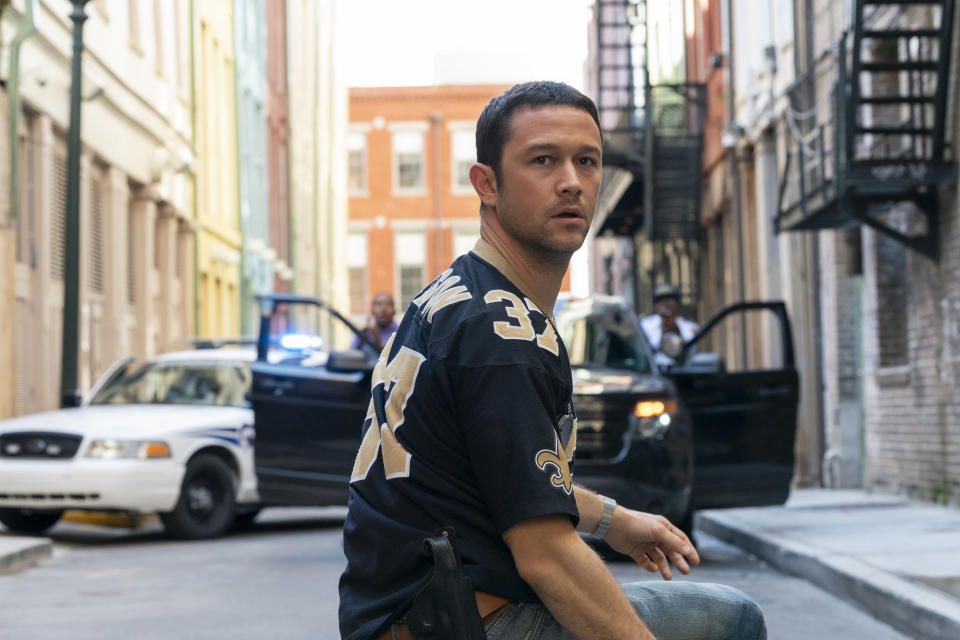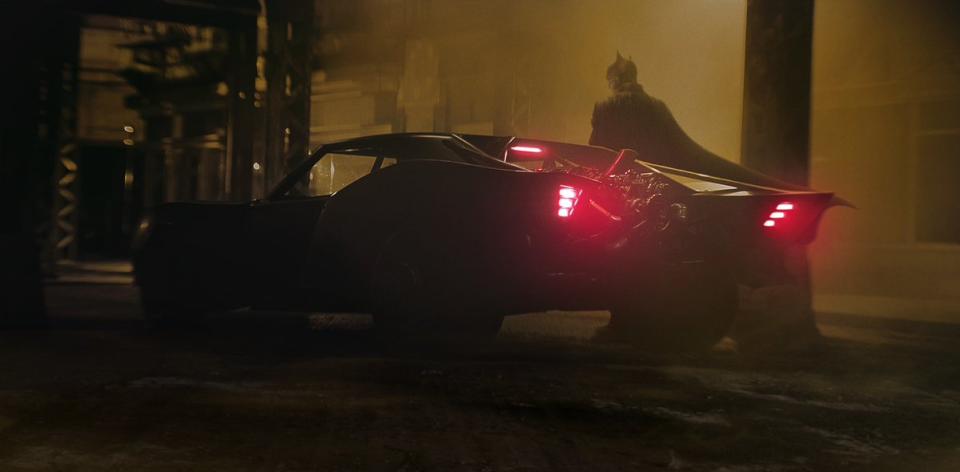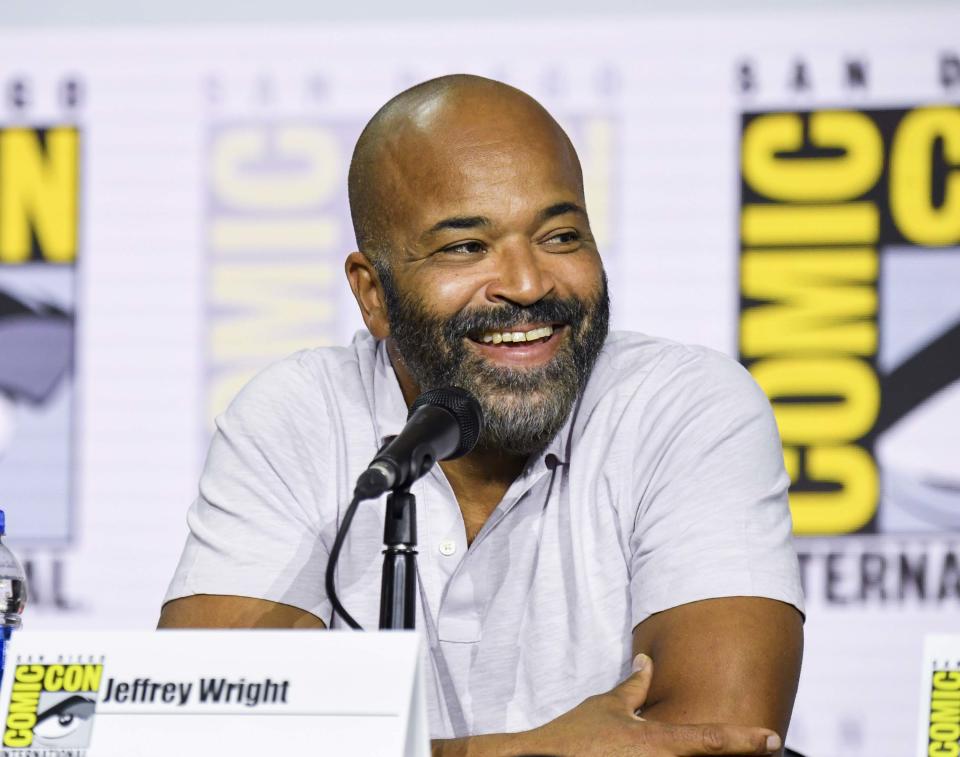How Netflix's new Black superhero movie 'Project Power' addresses real-life policing and 'how police should be held accountable'
When screenwriter Mattson Tomlin sat down to write Project Power in 2016, he knew that he wanted to create a superhero universe that put Black heroes front and center. The film that arrives on Netflix on Aug. 14 stays true to that vision, with Jamie Foxx and Dominique Fishback portraying the dynamic duo of Art and Robin, who take on a top-secret government agency that’s dispensing ability-enhancing pills on the streets of New Orleans. But there’s also a third superhero in the mix: a white police officer named Frank (played by Joseph Gordon-Levitt), who is the kind of “plays by his own rules” cop that’s been a popular Hollywood protagonist for decades.
As the film begins, Frank’s personal rules include popping those contraband pills to get a super-powered boost for daring busts. But after Art and Robin awaken him to the sordid story behind those drugs — a story that includes the exploitation of Black research subjects — he opts to join their cause. “Ultimately, the character goes through the movie trying to do the right thing,” Tomlin says. “Sometimes he goes about it in a messy way, but that's where his heart is.”
But both Tomlin and Gordon-Levitt are all too aware that Project Power is coming out at a time when the public at large is questioning the way police have traditionally been depicted on TV and movie screens. The Black Lives Matter protests that sprang up around the country following the death of George Floyd directly addressed abusive policing, and make characters like Frank seem like the product of a different time. “There’s a lot of good, necessary discussion around the power that’s given to police … and how police should be held accountable for that power,” Gordon-Levitt tells Yahoo Entertainment, before echoing Tomlin’s argument that Frank is ultimately on the right side of justice by the time the film ends. “This movie does portray a police officer who is not a perfect person, and not following the rules perfectly. Ultimately, I think he’s coming from a good place.” (Watch out video interview above.)

“I still like to think that most cops are coming from a good place, and most cops do want to be helpful,” the actor continues, turning to the thorny question of real-life officers who have been directly involved in the violent deaths of Black men and women like Floyd, as well as Breonna Taylor and Eric Garner. “The problem is that there’s too many examples of these tragic brutal circumstances where it’s not being helpful at all, and they’re not being held responsible for those actions. I think this movie does ask some important questions, like, ‘Who has the power in our society and who doesn’t? And is that fair, that dynamic of power?’ If we could all just be on equal footing and have a more equal distribution of power than maybe some of these brutal tragedies could be avoided.”
As a screenwriter, Tomlin recognizes the “real responsibility” he has in shaping the public perception of police through the lens of blockbuster entertainment. “When you look at Frank, that’s what you want a police officer to be,” he argues. “You get this sense of someone who was born and raised in New Orleans, so he really cares about his community and he has real problems with the way that the system of policing is run. At the same time, he’s popping that power and he’s doing things he knows he shouldn’t be doing. So there’s nuance there; I don’t think he’s a character designed to reflect the reality that we’re in — I think he’s designed to reflect what we wish all cops could be.”
Interestingly, Tomlin reveals that his first draft of Project Power was set in Portland, Ore., rather than New Orleans, a city that has recently been in the headlines due to the controversial presence of both city police officers, as well as federal agents. “There was a lot of that kind of vibe in the script before we had really seen it manifest in Portland,” he says, adding that he always intended to integrate real-world complexities into his fictional superhero universe. “The best version of science fiction is the one were you have what you call, the ‘refrigerator moment.’ You want people to see the movie and go about their day, and then when they’re standing at the refrigerator trying to figure out what they’re going to eat, something pops into their brain and they go, ‘Wow, that’s just hitting me about this movie!’ There’s so much opportunity to make this big, loud, fun popcorn movie, but also have it really be about something.”
While Project Power was made before the current policing protests, Tomlin’s next project has the potential to respond to the new world Hollywood finds itself in: he’s the co-writer of The Batman, Matt Reeves’s high-profile reboot starring Robert Pattinson as the Dark Knight. Gotham City’s vigilante has historically had a tumultuous relationship with the metropolis’s law enforcement, headed up by Commissioner James Gordon, who will be played by Jeffrey Wright in Reeves’s movie.

In addition to being the first Black actor to portray Gordon onscreen, Wright’s presence as the head of Gotham’s police force sets up a dramatic —and timely — dynamic between his own officers, not to mention Pattinson’s white vigilante. Production on The Batman shut down when the coronavirus pandemic broke out in March, but shooting has recently resumed in London. “The whole goal is to make it safe,” Tomlin says of how the film is adjusting to pandemic-mandated restrictions. “It’s a really scary time out there, so not putting peoples’ lives in jeopardy has to be the first goal, and I know they’re doing that in spades.”
Because The Batman is still midway through production, Tomlin declines to reveal the specifics of how Wright’s Gordon will depart from previous commissioners. But he stresses that he and Reeves are setting out to refresh a big-screen franchise that’s been around for 30 years and counting, and casting the Westworld star is just one example of the changes they have planned.

“These franchises have these tremendous fan bases that are decades old, and I’m certainly part of them,” Tomlin explains, noting that Batman: The Animated Series was his particular gateway into Gotham. “But you have to look at ways to do something new with it, and to say something new while still respecting what it is. We really looked at the entire history of the character, and depending on the lens that people look through, they’ll be able to see little touchstones about what Batman is to them. Matt is on a journey to make a stunningly emotional and very relevant film that has been around longer than any of us, and that involves making some changes to reflect the world around us today.”
As for those fans might preemptively complain about Wright, Tomlin has two words for them: Michael Keaton. “Everybody was very upset that Mr. Mom was playing Batman,” he says of Keaton’s controversial casting in Tim Burton’s 1989 hit. Flash-forward to 2020, and reports that the actor may once again don the Batsuit drove Twitter into a Bat-frenzy. “What’s so great about this fandom is that they clearly care and have opinions, and it’s put to the creative team to win them over every single time,” the writer says. “So do I worry about changing something that people are going to hate? Not really, because the movie is going to have its day in court, and honestly I think it’s going to blow people away.”
Gordon-Levitt, of course, previously played a Gotham City cop — who was ultimately revealed to be a version of Robin — in The Dark Knight Rises. Asked whether he has any advice for how Hollywood should address policing in movies going forward, he makes it clear there are no easy answers. “I wouldn’t leave it entirely up to entertainers like me,” he stresses. “There’s some degree to which Hollywood is pure entertainment, but there is some real evidence that harm can be done when entertainment is the only litmus test for what gets put in movies. These tropes build up of this heroic brutally violent cop saving the day through brutal violence, and that’s probably not the most helpful story to keep telling over and over again.”
“A lot of times saving the day is more nuanced or mundane, something that doesn’t require a spectacular fight or chase, but that might not seem as many movie tickets,” Gordon-Levitt continues. “That’s maybe not the moviemakers’ responsibility, or they at least share that responsibility with movie watchers. It’s a complicated question, and I won’t claim to have the perfect answer.”
Project Power is currently streaming on Netflix.
Watch our full interviews with the Project Power cast
Read more from Yahoo Entertainment

